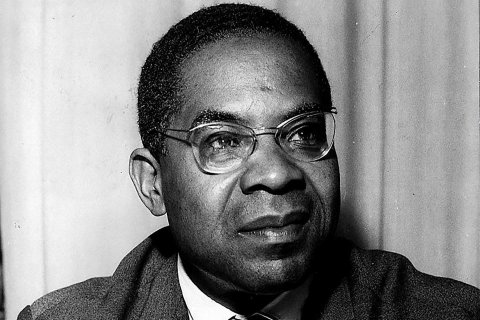Aimé Césaire

Title: Aimé Césaire: A Pioneer of Négritude and Anti-Colonialism
Introduction: Born in the French colony of Martinique, Aimé Césaire was a groundbreaking poet, playwright, and politician who emerged as a leading voice in the mid-20th century's anti-colonial and Black liberation movements. His work explored themes of identity, oppression, and liberation, leaving a lasting impact on literature and political thought.
Early Life and Education: Born on June 26, 1913, in Basse-Pointe, Martinique, Aimé Césaire was the son of a notary and a seamstress. He displayed a keen intellect from an early age, excelling in his studies and earning a scholarship to attend the prestigious Lycée Schoelcher in Fort-de-France. Césaire's education exposed him to French literature and philosophy, which would later influence his own writing style and intellectual development.
In 1931, Césaire moved to Paris to study at the prestigious Lycée Louis-le-Grand. There, he encountered other students from the French Caribbean, Africa, and Asia, which sparked his interest in issues of race, colonialism, and cultural identity. He became involved in political activism and joined the Communist Party.
Literary Contributions: Aimé Césaire's literary career began with the publication of his groundbreaking collection of poems, "Notebook of a Return to the Native Land" ("Cahier d'un retour au pays natal"), in 1939. This work was a lyrical and passionate exploration of his experiences as a black man in a colonial society. It introduced the concept of négritude, an affirmation of the beauty and value of African and Caribbean culture, which became a key component of the anti-colonial movement.
In 1950, Césaire published his play "And the Dogs Were Silent" ("Et les chiens se taisaient"), which addressed the oppression of Black people during World War II and the Holocaust. This play, along with his other writings, challenged colonial narratives and sparked discussions about racial equality and human rights.
Political Activism and Legacy: In addition to his literary achievements, Aimé Césaire was an active politician. He served as a deputy in the French National Assembly from 1945 to 1993, representing Martinique. Césaire advocated for the rights of Black and colonial peoples, demanding an end to racial discrimination and the recognition of cultural diversity within the French Republic.
Césaire's contributions to literature, politics, and the anti-colonial movement left a significant impact on the 20th century. His work inspired a generation of writers, activists, and intellectuals, influencing the Black Arts Movement and the Civil Rights Movement in the United States. Césaire's legacy continues to resonate today, reminding us of the ongoing struggles for racial justice and equality.
Recognition and Awards: Throughout his life, Aimé Césaire received numerous accolades for his work. In 1956, he was awarded the Lenin Peace Prize, and in 1995, he was honored with the Grand Cross of the Legion of Honor, France's highest decoration.
Conclusion: Aimé Césaire's profound influence on literature, politics, and the anti-colonial movement left an indelible mark on the 20th century and beyond. His writings explored themes of racial identity, liberation, and cultural pride, challenging colonial narratives and inspiring generations of activists and intellectuals. Césaire's work remains a powerful reminder of the ongoing struggle for racial justice and equality.







